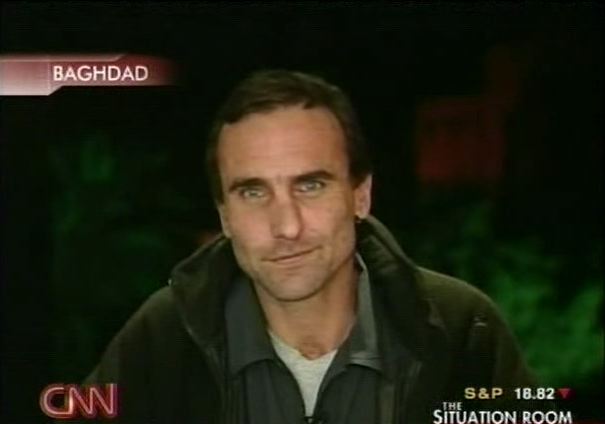TSR: "The sound of machine-gun fire"

Click photo to play
Length: 4:13
WOLF BLITZER: Meanwhile, the United Nations Secretary-General, Kofi Annan, says he believes Iraq now is "almost" -- "almost," his word -- in a civil war. Some others are arguing, though, that the violence has passed that tipping point, certainly a while back.
Joining us now our correspondent in Baghdad, Michael Ware. Michael, as you know, there's a huge debate here in the United States, whether or not this is a civil war. The White House, the Bush administration denies U.S. troops are involved in a civil war in Iraq. The Iraqi government, Prime Minister Nouri al-Maliki denies this is a civil war. But a lot of other experts not only say it is a civil war, it may be one of the most brutal and violent civil wars of recent memory. You're there on the ground. Is this a civil war?
WARE: Well, what I can tell you, Wolf, for example is right now as I'm speaking to you, there's a gun battle under way, the sound of machine-gun fire in a neighboring suburb. It's a Sunni area, where it's known that Shia death squads, often in police uniforms, roam and the locals band together to repel them. That could very well be going on as we are speaking to each other.
Certainly in the rest of Iraq tonight, that's what communities are doing, banding together, using telephones and SMS and even blog sites to coordinate as death squads move in and they prepare their defenses. The debate about whether this is a civil war is fueled either by the luxury of distance, those who aren't here living on the ground, or is fueled by the spin of those with a political agenda to deny its existence.
The basic definition is a war by organized groups within a country. Some say it must be a battle over the political center with at least 1,000 dead, involving neighborhood on neighborhood, militia style combat, elements of ethnic cleansing, you know, family on family, coordination and organization. Well, Wolf, you can tick every box.
We now have institutionalized death squads in police uniforms. You're having Sunni patients pulled out of Shia-controlled hospitals. You have neighborhoods with fighting positions. You have districts engaged in mortar wars, one neighborhood lobbing bombs on another neighborhood and them retaliating. People carry dual identity cards, one Sunni, one Shia. Children dare not go to school for fear of crossing ethnic lines. Wolf, if this is not a civil war, then I don't want to see one when it comes.
BLITZER: Is it likely, based on what you see on the ground there, Michael -- you've been there for more than three years -- that the violence could even get worse?
WARE: Oh, I don't think that that would be a difficult thing to imagine at all. Put it this way. When I would speak to some of the most senior members of the U.S. military intelligence here in Iraq, when they were asked to define civil war, some time ago, they would say that well we're not at civil war yet, this is largely an al Qaeda-led sectarian conflict.
It requires al Qaeda to attack to provoke some kind of response from the Shia. They said it will not be civil war until it develops its own momentum, that the Shia attack unprovoked. Well, we passed that way back earlier this year. And U.S. military intelligence themselves said at first, we saw the Shia attacks were targeted, against specific individuals; now, we see mass killings by the Shia just like we've been seeing mass killings by the Sunnis.
U.S. military intelligence then said well it won't be civil war until we see the body politic, the general population being pulled apart. Well, Wolf, we've got that now. So, really, it's easy to see, even by conservative military intelligence dynamics that this thing has been rolling along and getting worse, and so far, there is nothing to suggest that that won't continue to deteriorate.
BLITZER: Michael Ware, reporting for us from Baghdad, Michael, thanks very much.
WARE: Thank you, Wolf.
